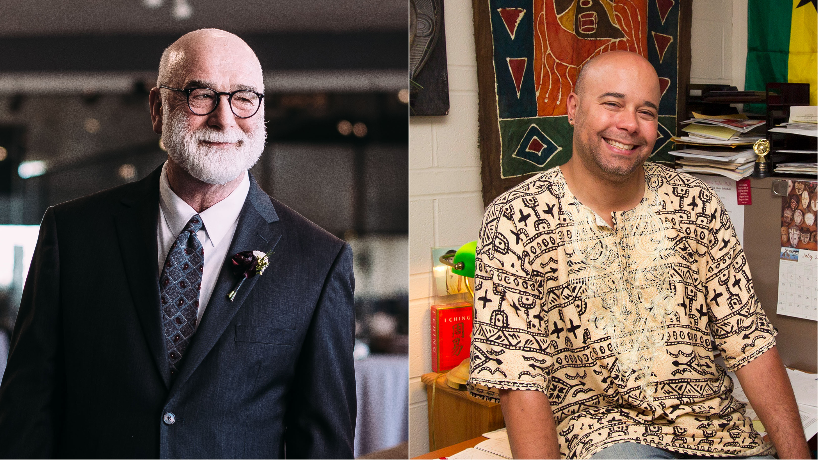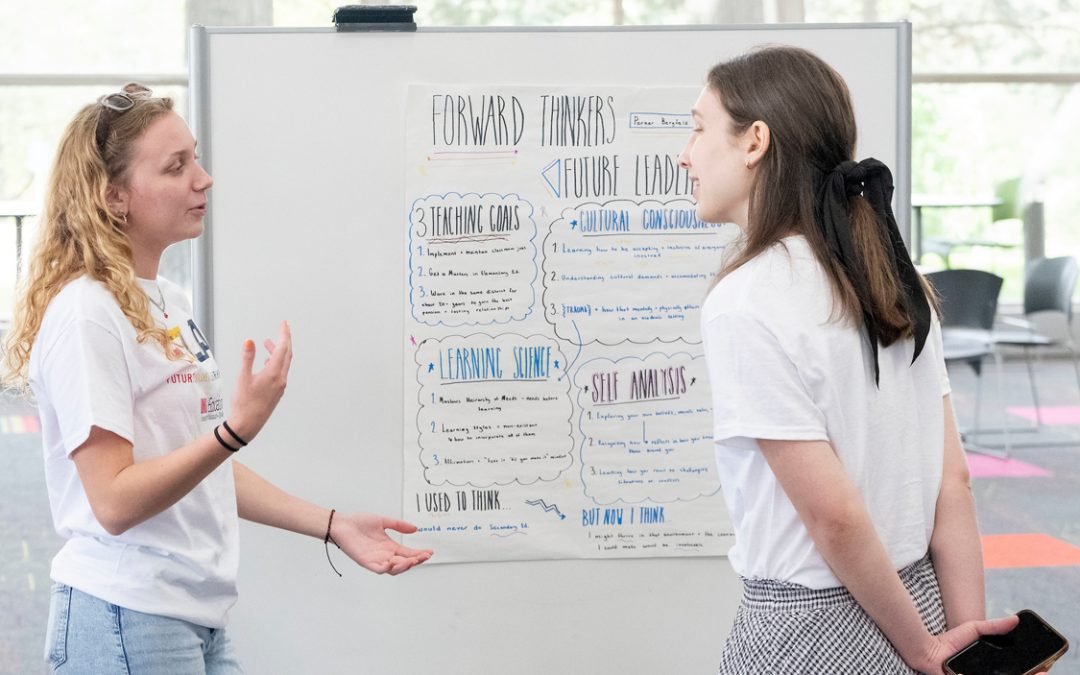
Associate Professor of Psychological Sciences Matthew Taylor and Associate Teaching Professor of Sociology Larry Irons head up a new working group that strives to examine the cultural effectiveness and reception of public health messaging about COVID-19 in under-resourced St. Louis neighborhoods. (Photos courtesy of Larry Irons and by August Jennewein).
People at the University of Missouri–St. Louis have stepped up to heal, learn, help and research in response to the COVID-19 pandemic. Their efforts this week span from researching effective health communications to making UMSL more affordable to remembering those who are fallen and sorely missed and more.
Group working to examine effectiveness of COVID-19 communications
A new interdisciplinary group at UMSL that seeks to examine the cultural effectiveness and reception of public health messaging about COVID-19 in under-resourced St. Louis neighborhoods received $1,000 in seed funding from CONVERGE last week.
Associate Professor of Psychological Sciences Matthew Taylor and Associate Teaching Professor of Sociology Larry Irons head up the initiative. The goal of the group, Taylor explained, is to understand how to better communicate and disseminate information to under-resourced urban communities. They plan to examine cultural themes and buy-in, broadband access and more.
CONVERGE is a National Science Foundation-funded initiative that advances interdisciplinary research and has a focus on disaster preparedness. It’s headquartered at the Natural Hazards Center at the University of Colorado Boulder.
“Messaging matters,” Taylor said. “At the end of the day, the goal is to improve disaster communication, whether it’s COVID, whether it’s a flood, whether it’s an earthquake, and really try to come up with some best practices for public health entities and even policymakers for culturally effective communication strategies.”
The group is working to prepare a white paper by June 17 for CONVERGE while continuing to recruit team members. Afterward, they will select populations to focus on and work on building ties with community leaders.
Other group members include Associate Teaching Professor of Communication Jill Alexander, Associate Teaching Professor of Sociology James Craig, Interim Co-Director of the Community Innovation and Action Center Paul Sorenson, National Security and Community Policy Collaborative Director Bob Ubbelohde, Associate Professor of Political Science Adriano Udani and Associate Professor of Communication Stephanie Van Stee.
Dean Charles Hoffman participates in UM System virtual roundtable
UMSL College of Business Administration Dean Charles Hoffman joined business and law school deans from the four University of Missouri System universities last Thursday to discuss challenges and solutions facing business and industry as a result of the coronavirus pandemic.
The UM System hosted the virtual roundtable, which was titled “Resilience & Recovery: Business and Law Topics for Navigating the COVID-19 Economy.”
Hoffman discussed considering risk in business planning and adding the topic to the UMSL supply chain curriculum, the future of consumer spending, the effect of the pandemic on jobs as students graduate and more.
“Two months ago, I was bragging that our graduates were receiving two and three job offers,” Hoffman said. “I kept telling them how lucky they are. Well, I’m not saying that anymore because many of those job offers have been rescinded .… Understandably, young people feel less in control of their future, so consumer spending will continue down and unemployment will be high for the foreseeable future.”
UMSL waiving all online fees for fall semester in response to COVID-19
UMSL will continue to waive all online course fees through the fall semester to help students and families as they manage the financial challenges brought on by the COVID-19 pandemic.
UMSL had already waived online course fees for the summer semester as the university transitioned to fully online classes, providing students with more than $1.6 million in savings. The university has seen a credit hour enrollment increase of nearly 4 percent to date since making that announcement.
While the university is planning for a return to in-person classes for the fall, UMSL has increased its fully online and blended course offerings to give students flexibility and meet student preferences for course formats.
“UMSL has been and will always be committed to access and affordability,” UMSL Chancellor Kristin Sobolik said. “With the financial challenges facing students and their families, we must remain focused on doing everything possible to ensure they continue their academic progress, graduate and succeed in the workforce.”
ORA research webinar addresses domestic violence during pandemic
One in four women will experience domestic violence during her lifetime. It’s a grim reality that’s only become more acute as social distancing has stripped away outlets for victims of domestic violence.
“If you’re anything like me, probably one of the first things that you thought of when this COVID-19 pandemic hit and there were the stay-at-home orders coming down and school closures was, ‘What is this going to do to people whose homes or households are already unsafe?’” Assistant Professor of Social Work Annah Bender said.
Bender’s question was part of the opening of a webinar discussion held on Friday, along with Kimberly Werner, associate dean for research in the College of Nursing. During the hour-long talk, the two discussed the amplifying effects of coronavirus on domestic violence.
Their talk, “Incidence of Domestic Violence During COVID-19: Challenges and Research Directions,” was part of an ongoing series organized by the UMSL Office of Research Administration that focused on generating conversation geared toward research during the pandemic.
The two covered the definition and impact of domestic violence and intimate partner violence, how COVID-19 has intensified the risk of domestic violence incidents, intergenerational trauma, the effect of the pandemic on support services, services and help available to victims and directions for research, among other topics.
“The ultimate goal is to increase our research in this area,” Werner said. “There’s been a lot of resources that are coming out that are COVID related. There’s been a lot of conversation where COVID has actually brought domestic violence to the forefront … COVID has really ramped up people’s ability to understand the importance of addressing domestic violence, helping victims turn into survivors.”
The Washington Post features Judy Wilson-Griffin
On May 18, The Washington Post featured College of Nursing DNP student Judy Wilson-Griffin as part of its ongoing series “Faces of the Dead,” which explores the lives of Americans who have died from coronavirus.
Wilson-Griffin, a beloved perinatal clinical nurse practitioner, was the first person in St. Louis County to pass away as a result of the pandemic. Read the tribute to her life and aspirations here.














